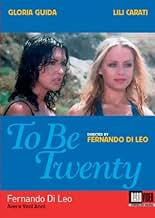AVALIAÇÃO DA IMDb
5,8/10
1,3 mil
SUA AVALIAÇÃO
Anos 70, tempos de sexo livre e movimento hippie. Lia e Tina são duas jovens em busca de diversão sem precedentes. Influenciadas pela atmosfera libertária, procuram saciar seus desejos sexua... Ler tudoAnos 70, tempos de sexo livre e movimento hippie. Lia e Tina são duas jovens em busca de diversão sem precedentes. Influenciadas pela atmosfera libertária, procuram saciar seus desejos sexuais, sem pudores, sem limites.Anos 70, tempos de sexo livre e movimento hippie. Lia e Tina são duas jovens em busca de diversão sem precedentes. Influenciadas pela atmosfera libertária, procuram saciar seus desejos sexuais, sem pudores, sem limites.
Carmelo Reale
- Head of rapists
- (as Roberto Reale)
Raul Lovecchio
- Vice-commissioner
- (as Raoul Lo Vecchio)
Salvatore Billa
- Delinquente in Bar
- (não creditado)
Angelo Boscariol
- Cliente in trattoria
- (não creditado)
Avaliações em destaque
In his 1978 film "Avere vent'anni" (To Be Twenty), director Fernando Di Leo attempts to capture the essence of youth, rebellion, and the complexities of growing up during a tumultuous era in Italy. Starring Gloria Guida and Lili Carati as two young women embarking on a journey of self-discovery, the film offers an intriguing blend of drama, comedy, and social commentary. However, despite its promising premise and some noteworthy performances, the movie ultimately falls short of delivering a truly memorable experience.
The film follows Lia (Gloria Guida) and Tina (Lili Carati) as they escape their restrictive lives in search of freedom and adventure. Their journey takes them from the countryside to the bustling city, where they encounter a variety of characters and situations that challenge their beliefs and force them to confront their own naivety. As they navigate their way through this new world, they must also grapple with issues such as sexuality, politics, and the ever-present threat of violence.
One of the film's strongest aspects is its depiction of the social and political climate of 1970s Italy. Di Leo does an excellent job of capturing the tension and unrest that permeated the country during this time, as well as the sense of disillusionment felt by many young people. The film's exploration of these themes adds a layer of depth and relevance that elevates it above a simple coming-of-age tale.
Another highlight of "Avere vent'anni" is the chemistry between Gloria Guida and Lili Carati. Their performances as Lia and Tina are both engaging and believable, effectively conveying the sense of excitement, confusion, and trepidation that comes with being on the cusp of adulthood. The bond between their characters is palpable, and their friendship serves as the emotional core of the film.
However, despite these strengths, "Avere vent'anni" suffers from a number of flaws that prevent it from reaching its full potential. One of the most glaring issues is the film's uneven tone, which oscillates between serious drama and slapstick comedy without ever finding a satisfying balance. This inconsistency can be jarring at times, and it often undermines the emotional impact of certain scenes.
Additionally, the movie's pacing can be sluggish, with some sequences feeling overly drawn out and others rushing through important plot points. This unevenness makes it difficult to fully invest in the story or the characters, and it contributes to a sense of disjointedness that permeates the film.
In conclusion, "Avere vent'anni" is a film with both commendable qualities and significant flaws. While its exploration of 1970s Italian society and the performances of Gloria Guida and Lili Carati are certainly noteworthy, the movie's uneven tone and pacing issues ultimately detract from its overall impact. Despite these shortcomings, however, the film remains an intriguing, if flawed, examination of youth, rebellion, and the search for identity during a tumultuous period in history.
The film follows Lia (Gloria Guida) and Tina (Lili Carati) as they escape their restrictive lives in search of freedom and adventure. Their journey takes them from the countryside to the bustling city, where they encounter a variety of characters and situations that challenge their beliefs and force them to confront their own naivety. As they navigate their way through this new world, they must also grapple with issues such as sexuality, politics, and the ever-present threat of violence.
One of the film's strongest aspects is its depiction of the social and political climate of 1970s Italy. Di Leo does an excellent job of capturing the tension and unrest that permeated the country during this time, as well as the sense of disillusionment felt by many young people. The film's exploration of these themes adds a layer of depth and relevance that elevates it above a simple coming-of-age tale.
Another highlight of "Avere vent'anni" is the chemistry between Gloria Guida and Lili Carati. Their performances as Lia and Tina are both engaging and believable, effectively conveying the sense of excitement, confusion, and trepidation that comes with being on the cusp of adulthood. The bond between their characters is palpable, and their friendship serves as the emotional core of the film.
However, despite these strengths, "Avere vent'anni" suffers from a number of flaws that prevent it from reaching its full potential. One of the most glaring issues is the film's uneven tone, which oscillates between serious drama and slapstick comedy without ever finding a satisfying balance. This inconsistency can be jarring at times, and it often undermines the emotional impact of certain scenes.
Additionally, the movie's pacing can be sluggish, with some sequences feeling overly drawn out and others rushing through important plot points. This unevenness makes it difficult to fully invest in the story or the characters, and it contributes to a sense of disjointedness that permeates the film.
In conclusion, "Avere vent'anni" is a film with both commendable qualities and significant flaws. While its exploration of 1970s Italian society and the performances of Gloria Guida and Lili Carati are certainly noteworthy, the movie's uneven tone and pacing issues ultimately detract from its overall impact. Despite these shortcomings, however, the film remains an intriguing, if flawed, examination of youth, rebellion, and the search for identity during a tumultuous period in history.
In Fernando Di Leo's 1978 crime drama "Avere vent'anni" (English: "To Be Twenty"), the director takes viewers on a gritty and unflinching exploration of Italy's criminal underworld. Set against the backdrop of Rome's seedy underbelly, the film follows the intertwining stories of two young women, Gloria (Gloria Guida) and Liliana (Lili Carati), as they navigate the treacherous world of prostitution, drugs, and exploitation.
Di Leo's directorial approach is both raw and unapologetic, pulling no punches in its portrayal of the harsh realities faced by the film's protagonists. The gritty cinematography and naturalistic acting style lend an air of authenticity to the proceedings, immersing the audience in the sordid world depicted on screen.
Gloria Guida's performance as the naive and vulnerable Gloria is a standout, capturing the character's descent into a life of desperation and exploitation with heartbreaking realism. Lili Carati, on the other hand, brings a sense of world-weariness to her portrayal of Liliana, a seasoned sex worker who has become hardened by the brutal realities of her profession.
While the film's subject matter is undoubtedly challenging and at times uncomfortable, Di Leo handles it with a deft touch, avoiding sensationalism and instead offering a nuanced and empathetic portrayal of the characters' struggles. The director's unflinching lens exposes the harsh truths of a society that often turns a blind eye to the exploitation of its most vulnerable members.
However, "Avere vent'anni" is not without its flaws. The pacing can feel uneven at times, and some of the narrative threads feel underdeveloped or left dangling. Additionally, the film's relentless bleakness can be a bit overwhelming, leaving little room for moments of levity or respite.
Despite its shortcomings, "Avere vent'anni" remains a powerful and thought-provoking exploration of the darker corners of Italian society. Di Leo's masterful direction, combined with the standout performances of Gloria Guida and Lili Carati, make this a film that lingers in the mind long after the credits roll.
Di Leo's directorial approach is both raw and unapologetic, pulling no punches in its portrayal of the harsh realities faced by the film's protagonists. The gritty cinematography and naturalistic acting style lend an air of authenticity to the proceedings, immersing the audience in the sordid world depicted on screen.
Gloria Guida's performance as the naive and vulnerable Gloria is a standout, capturing the character's descent into a life of desperation and exploitation with heartbreaking realism. Lili Carati, on the other hand, brings a sense of world-weariness to her portrayal of Liliana, a seasoned sex worker who has become hardened by the brutal realities of her profession.
While the film's subject matter is undoubtedly challenging and at times uncomfortable, Di Leo handles it with a deft touch, avoiding sensationalism and instead offering a nuanced and empathetic portrayal of the characters' struggles. The director's unflinching lens exposes the harsh truths of a society that often turns a blind eye to the exploitation of its most vulnerable members.
However, "Avere vent'anni" is not without its flaws. The pacing can feel uneven at times, and some of the narrative threads feel underdeveloped or left dangling. Additionally, the film's relentless bleakness can be a bit overwhelming, leaving little room for moments of levity or respite.
Despite its shortcomings, "Avere vent'anni" remains a powerful and thought-provoking exploration of the darker corners of Italian society. Di Leo's masterful direction, combined with the standout performances of Gloria Guida and Lili Carati, make this a film that lingers in the mind long after the credits roll.
This movie is available in two versions. The English-language version is a badly-dubbed, waste-of-time sex comedy (not unlike a lot of the films co-lead Gloria Guida was starring in at the time). The Italian version is similarly light-hearted for much of its running time, but it does make some serious commentary on police corruption, the confused politics and ultimate hollowness of the 70's era counterculture, and the reactionary nature of male-dominated rural Italy. The ending is unforgettably brutal, inspired no doubt by films like "Last House on the Left" or "Late Night Trains". Like those films it was quite controversial, and really for the same ironic reason--because you really come to like the two lead characters and care what happens to them. This is no mean feat as Gloria Guida had no real acting talent beyond looking (really) good naked and the other lead, porno-starlet-to-be Lili Carati, was, if anything, even less talented.
The plot of the movie is rather loose and picaresque. It follows these two "beautiful and p***ed-off" girls as they hitchhike, shoplift, crash at a commune, dabble in prostitution, sell encyclopedias to lecherous university professors, get rousted by the police, and finally meet a tragic end at a roadhouse. Along the way the way they more than fulfill the sexploitation skin quotient and frequently throw themselves at various men who hilariously rebuff them (although despite the famed sexual aggressiveness of Italian men, it is not impossible to believe that they might react this way if the tables were suddenly turned on them). It is this free-spirited sexual aggressiveness that proves to be downfall of the two girls, but this movie is ultimately more touching and tragic than cautionary and moralistic--traditional, male-dominated Italian society certainly doesn't come off to well here.
The two versions have different discoesque musical arrangements that the characters do sexy, impromptu dances to--the Italian one is kind of catchy but the English-language is about as enjoyable as a barium enema. I would't bother with the English-language version, but the Italian version is definitely a worthwhile little movie.
The plot of the movie is rather loose and picaresque. It follows these two "beautiful and p***ed-off" girls as they hitchhike, shoplift, crash at a commune, dabble in prostitution, sell encyclopedias to lecherous university professors, get rousted by the police, and finally meet a tragic end at a roadhouse. Along the way the way they more than fulfill the sexploitation skin quotient and frequently throw themselves at various men who hilariously rebuff them (although despite the famed sexual aggressiveness of Italian men, it is not impossible to believe that they might react this way if the tables were suddenly turned on them). It is this free-spirited sexual aggressiveness that proves to be downfall of the two girls, but this movie is ultimately more touching and tragic than cautionary and moralistic--traditional, male-dominated Italian society certainly doesn't come off to well here.
The two versions have different discoesque musical arrangements that the characters do sexy, impromptu dances to--the Italian one is kind of catchy but the English-language is about as enjoyable as a barium enema. I would't bother with the English-language version, but the Italian version is definitely a worthwhile little movie.
Some time in the mid-70s, out-of-luck director Fernando di Leo had a million dollar idea: Why not do a remake of one of the top grossing blockbusters of 1969, with a slightly altered tagline: "Two chicks went looking for Italia and couldn't find it anywhere." And since those chicks would hitchhike across the country to join a hippie community, they didn't even need those pricey motorbikes! The Captain America role went to Euro teen star blonde Gloria Guida, the Billy part to the lesser-known Lilli Carati, a downright stunning brunette literally acting out every single word of her dialogue: I'm young, hot, and p*ssed off. Does anybody here f*ck?" A radically pessimistic statement from the bleak opening beach scene to the unforeseeable (and utterly disgusting) climax, Avere vent'anni bites off more than di Leo could chew: His counterculture swan song about two female libertines who inescapably will go to the dogs never finds a rhythm, a loose, sloppy concoction of scenes that don't blend, a programmatic reading from Valerie Solanas's SCUM manifesto (A pip-squeak with dysfunctional femininity that despises women: That is man.") remaining fairly more than a nod to the feminist zeitgeist in Fernando's T&A exploitation circus. Two stars for the boisterous performance of the lead actresses, reciprocating between vulnerability, sexual aggression, and pure, breathless joie de vivre, especially in the dance scene on the piazza; another one for Ray Lovelock's fine interpretation of a disenchanted druggie, and one and a half for the super catchy theme song. Ah, and as for Signorina Carati: Eat your heart out, Dennis Hopper.
I had seen this before but in the much altered English language version without the the awful denouement of this original cut. Some consider the difficult and explicitly violent end rather inappropriate and not in keeping with the rest of the film. But, Fernando Di Leo was a fine director who also wrote much of the films he made, including this one and most of his films had a strong political stance. His, Caliber 9 is a great crime thriller example and this is a very decent sexploitation one. The lovely Gloria Guida is a bit led astray by the character played by Lilli Carati, as the cheat, steal and generally behave obnoxiously in the name of freedom. I don't know how realistic the commune presented here was in Italy but it doesn't seem like any other I've seen depicted. Even Valerie Solanas' S.C.U.M manifesto gets quoted here in the name of feminism and it is about at this stage (when a film maker is introduced) that we begin to realise what a gigantic swipe the writer/director is taking at the counter culture and its opponents. Nobody comes out of this well and the brilliantly directed ending will haunt for some time.
Você sabia?
- CuriosidadesNamed #8 on the list of 10 Best Sexploitation Movies of All Time by website TheCinemaholic in 2017.
- Versões alternativasThe movie was re-cut shortly after the Italian release. The 81-minute version omits the opening scene on the beach, the sequence featuring explicit lesbian sex between the two main characters, and the violent ending.
- Trilhas sonorasAvere vent'anni
Written by Silvano Spadaccino (as Spadacino), Fernando Di Leo (as Di Leo)
Sung by Gloria Guida
Principais escolhas
Faça login para avaliar e ver a lista de recomendações personalizadas
- How long is To Be Twenty?Fornecido pela Alexa
Detalhes
- Tempo de duração1 hora 34 minutos
- Mixagem de som
- Proporção
- 1.85 : 1
Contribua para esta página
Sugerir uma alteração ou adicionar conteúdo ausente





























